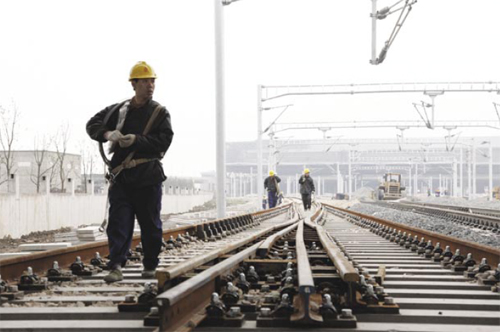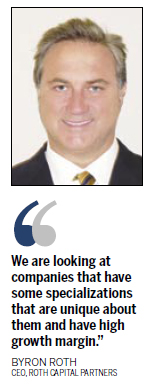US
Chinese stocks bloom in gloomy US markets
By Chen Weihua (China Daily)
Updated: 2010-08-31 17:11
 |
Large Medium Small |
|
 Workers lay railway tracks near a new station in Shanghai. China is spending 5 trillion yuan ($735 billion) on new railways by 2020. Shen Qilai / Bloomberg
|
NEW YORK - Despite lingering pessimism in the United States economy, some American investors have shown unabated interest in investing in Chinese companies listed on US stock markets.
"China's growth in comparison to the United States and Europe is very, very attractive," said Mark Tobin, director of research of ROTH Capital Partners, a California-based investment bank that provides financing and advisory services to emerging growth companies in the US and China.
Tobin said he has talked to a lot of mutual fund and hedge fund managers who are looking for growth companies. "When they look at the US, they are struggling to find any. When they look at Europe, it's even more difficult," Tobin told China Daily on Monday.
China's GDP growth has stood for the past year at or above 10 percent. China's growth is still several times higher than any other country's in the world even as it slows down to 8 percent.

China was the top performer worldwide last year during the global recession. The 70 US-listed Chinese companies covered by ROTH Capital have registered a return of over 100 percent over the last 18 months. In 2009, the return was more than 120 percent.
"There are more and more US investors looking at China and see what are the best strategies for them to participate in the growth," said company CEO Byron Roth.
Roth's words were echoed by Bill Ford, CEO of General Atlantic, a private equity investment firm that has also invested in China.
"We have been actively investing in China for over a decade and as global growth investors we continue to view the China market as very attractive," Ford said.
He said there are two key trends driving investment opportunities in China: the large and rapidly growing middle class that has impacted business and personal consumption and the fact that Chinese companies have global aspirations.
About 500 Chinese companies are now listed in the US, but half of them are inactive in the market. Only about 200-250 companies are worth looking into, Tobin said.
While he admitted that 2010 is a more difficult year than the last, Roth said his company takes a long-term view.
"We try to stay consistent and believe in the sectors we believe. So when the market is bad, we don't retreat that much because it will come back again," said Roth, who has traveled to China about six times a year during the last five years.
Roth believes that US-listed Chinese companies should continue to move up the food chain to make them more attractive to a wide range of US investors.
High on the agenda is to go for the Big Four - Deloitte, Ernst & Young, KPMG, PricewaterhouseCoopers - to improve all kinds of corporate governance to meet the high-standard US market and hire a law firm that understands both China and the US.
While this might take time, Roth said Chinese companies are evolving and "we are making sure that everybody recognizes that they get on the train and make themselves more attractive to US investors".
According to reports, investor perception of US-listed Chinese stocks has worsened during the past months due to concerns over corporate governance, internal controls, earnings quality and management credibility.
Croker Coulson, president of New York-based CCG Investor Relations, which advises on a number of US-listed Chinese firms, also expressed his worries.
"Many US investors have grown more cautious on investing in Chinese companies in recent months, largely due to concerns about accounting quality and corporate governance," Coulson told China Daily.
Wall Street's short sellers have grown more aggressive in exploiting differences that sometimes exist between these companies' financial reports filed with the SEC and with local bureaus of the State Administration of Industry and Commerce and other authorities in China to question if the revenue and earnings reported by Chinese companies can be trusted.
"This is setting the bar higher for Chinese companies to build up their internal accounting and finance teams, engage better known audit firms, and make sure that they have respected and active independent directors," Coulson said. "After a very active run of equity financings by Chinese issuers, some investors are also questioning if the money they put into these companies is being deployed effectively. In today's market, it is not enough to have strong numbers. Trust in management is the most important factor driving investor decisions."
"We expect companies that listen carefully to what matters to investors, show their commitment to public company infrastructure, and consistently execute their business plan will be rewarded over time," he added.
A due diligence session on all these concerns will be part of the 2010 ROTH Hawaii Conference to be held from Sept 1-3 at the Grand Wailea Resort in Maui.
Tobin acknowledged that while Chinese companies are usually regarded as riskier than US companies, sometime it is just a lack of understanding due to cultural differences or language barrier.
To Tobin, this has also become an opportunity for the company. "You get very high quality Chinese companies that are just misperceived and those are ones we try to identify and tell their stories to our investors," said Tobin.
In the three-day meetings in Maui, some 70 institutional investors will meet top executives from 18 US and 32 Chinese companies from a wide range of sectors such as media and Internet, software, clean technology, industrials, health care, business services, energy and infrastructure.
Most of these sectors will be discussed in details by a series of panels on China's macroeconomics, consumers, automotives, technology, energy, infrastructure and social infrastructure.
Tobin, who worked in Shanghai as director of China research for the company from 2007-09, said one common topic he has been talking a lot about is that what's going to happen next when the Chinese government stimulus package winds down. This has been a frequent question from investors in the infrastructure sector.
"My response is that you really have to decompose that sector. There is a segment that is still going to grow fast even the stimulus is gone. Rail, for example, will continue to perform well and the same is true with water infrastructure," he said.
ROTH Capital has also painted a rosy picture for the energy sector.
Chinese government recent plans to spend 5 trillion yuan ($735 billion) to develop clean energy sources and upgrade conventional energy uses over the next decade has also been regarded as unprecedented opportunities for alternative energy players.
There is also a high expectation for the domestic consumption to become a major driving force for China's GDP growth.
"We are looking at companies that have some specializations that are unique about them and have high growth margin," said CEO Byron Roth, adding that his research team in Shanghai has done an excellent job in identifying those firms in collaboration with researchers based in California.
China Daily